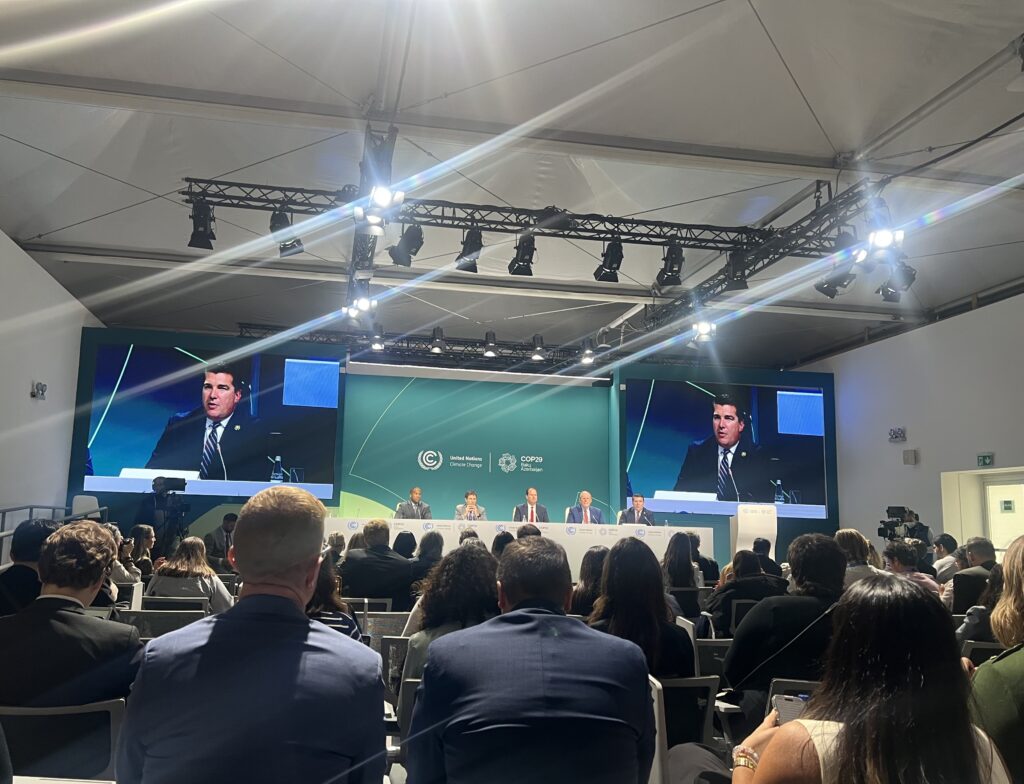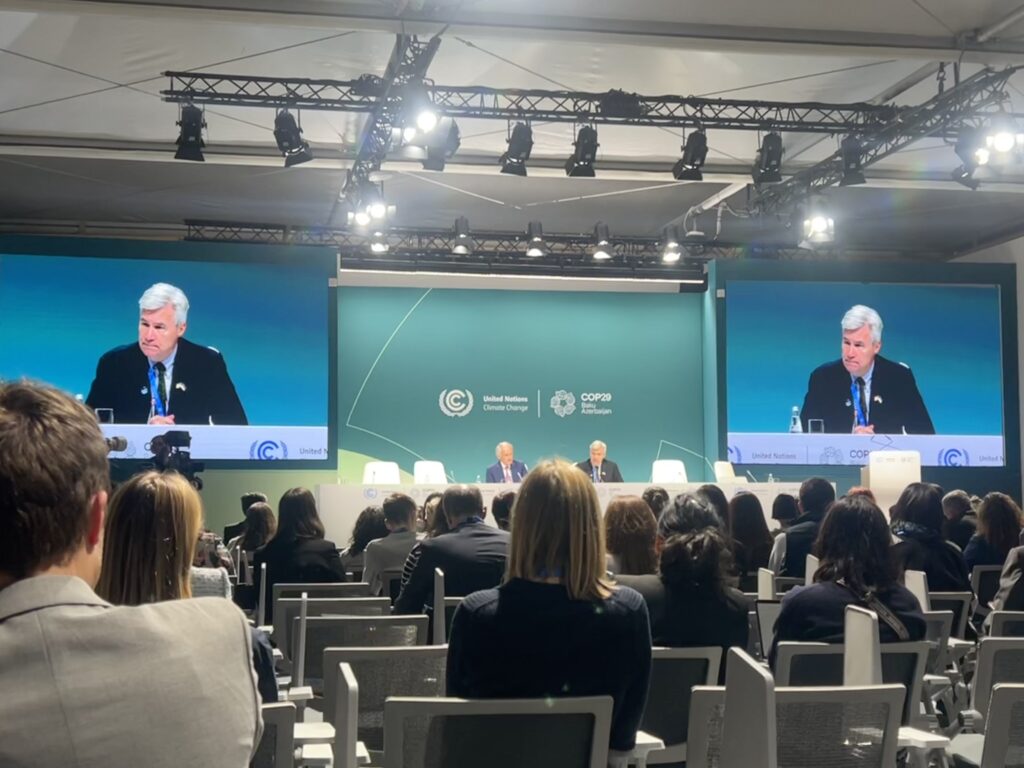By Ashley Entwistle, ’26, History-Political Science
As delegates from around the world gather in Baku to discuss the future of our climate, the results of the US election have left the US delegation divided on how to represent the nation’s climate future. The question of whether the US can remain a reliable international partner on climate action looms large with the Trump administration poised to withdraw from the Paris Agreement—echoing its 2016 decision—and perhaps even the UNFCCC this time around.
John Podesta, Senior Advisor to the President for Clean Energy Innovation and Implementation, and other cabinet members present at COP29, began the first week of the conference repeating the message that “We won’t turn back,” referring to the potential for subnational climate policy progress and the strong bipartisan backbone of the Inflation Reduction Act (IRA) that will withstand another Trump presidency. Last Saturday, however, Ella Reese-Clauson and I attended a press conference with five Republican Congressmen from the House Committee on Energy and Commerce, which sent the international community a different message.

On the panel, the five representatives argued for increasing oil and gas production. August Pflunger, representing Texas’ 11th congressional district, expressed the global need for more energy. He stated that heavy handed government mandates––those being discussed at COP29––“would seek to destroy this progress in a rush to a one size fits all energy solution would make us more reliant on countries like China, the world’s largest energy polluter.” As Pflunger spoke, he repeatedly emphasized the need for increased domestic energy production, in order to reduce reliance on “dirty” energy from China. In his words, I found the spirit of climate diplomacy and collaboration that COP had come to represent, where countries unite around working towards a common goal, begin to fade.
John James, representing Michigan’s 10th district, echoed Pflunger’s statements when discussing the need to stay ahead of energy demands and avoid dependency on “epic polluters” like China. Morgan Griffith, representing Virginia’s 9th congressional district—an area highly reliant on coal—stated, “an area that has natural resources should not be penalized,” referring to potential policies that could lead to restrictions on regional coal mines. This message mirrored Azerbaijani President Ilham Aliyev’s statement at the beginning of COP29, when he referred to Azerbaijan’s oil resources as a “gift from God.”
At the end of the panel, when asked about the future of climate finance, Pfluger merely deflected the question and reiterated his main energy goal: “What we want to do is unleash American energy and innovation around the world, benefiting a connected world with affordable, clean, reliable energy.” He added that if any topic being discussed at COP29 “is not congruent with or supportive of lowering energy costs while reducing emissions, you can bet that this Congress will take a closer look at it.”
The US Senate press conference took place an hour later. In between, I attended the Baku Climate Leadership Dialogue, a refreshing conversation between the COP29 Presidency and representatives from the seven indigenous socio-cultural regions, as defined by the UN. Upon returning to the press conference room, Democratic senators Ed Markey from Massachusetts and Sheldon Whitehouse from Rhode Island were on stage. Like the male-dominated US House panel, both senators were men, standing in contrast to the more gender-balanced panels presented by other delegations at COP.

The senators largely echoed earlier statements from US officials like John Podesta and Jennifer Granholm, asserting that “climate finance will outlive a climate denier,” and emphasizing that, despite the anticipated withdrawal from the Paris Agreement under the incoming Trump administration, a green revolution is still on the horizon. Markey declared that he and Whitehouse were “here to tell everyone that the US is still in it.”
The fight to get ahead of China was mentioned when Markey stated that it is in the US’s best interest to join the race for clean energy and to outpace China. He sees the IRA as the way forward, although he acknowledged that it will be “a mighty fight in the Senate and the House” with the upcoming Republican majority in both chambers.
The audience was noticeably less tense during the Senate panel—many of the same individuals who attended the earlier House panel were also present. However, this comfort took a turn when an Azerbaijani TV journalist diverted their attention from climate talk and asked the two senators why the US had not taken steps to sanction Armenia, in reference to the ongoing Nagorno-Karabakh conflict.
“I think Senator Markey and I support Armenia, both of us. We deeply regret the displacement of so many Armenians. To put it mildly, I’m far from convinced that Armenians are to blame for that,” said Whitehouse. “And I don’t want to dwell, in the home of my hosts, on human rights issues. But if that were to be the topic, I would not be very complimentary.”
Just a month before these delegates arrived in Azerbaijan, US lawmakers, including the two Senators, signed a letter urging Antony Blinken to demand that Ilham Aliyev release Armenian hostages prior to the conference.
Shortly after the senators’ response, the Azerbaijani journalist rose from her seat, visibly angered, and walked to the back of the room where the cameramen were set up. The security man told her that she was not allowed to go back into the camera area, though she proceeded, grabbed her cameraman by the arm, and the two of them left the scene.
The sheer contrast between the two panels was on my mind the following days. On Tuesday, November 19, our delegation had the opportunity to speak with the US Ambassador to Azerbaijan, the Special Presidential Envoy for Climate, as well as other State Department officials. I turned on my microphone and asked the US delegation what they were doing to ensure that the frequent political turnover and mixed messages, particularly those that came up in Saturday’s events, would not affect the international community’s perception of the US as a partner in climate action.
Ambassador Mark Libby responded frankly, acknowledging that it has been “super messy.” However, he added that, at the end of the day, it is this diversity of thought “lends credibility to democratic governance,” where people’s voices are heard, and the US does not have a single, “authoritative” voice.
Ambassador Libby began our private session by discussing his experience as an ambassador during a time when the US has openly supported Armenia. He explained that this has made it challenging to connect with people in the country he serves, though COP29 has, in many ways, helped to bridge that gap and shift focus away from the nation’s position on Armenia. Saturday’s interaction with the Azerbaijani press reignited that flame.